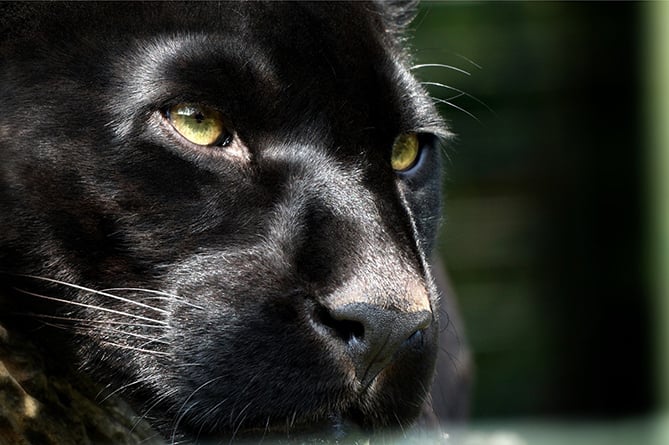An elderly Ceredigion smallholder has seen three of her sheep gruesomely killed in the last two days and says there is ‘no doubt’ a black leopard is responsible.
A Talsarn pensioner who contacted the Cambrian News is something of an expert when it comes to the much-debated presence of big cats in rural Ceredigion and the UK in general.
She said she has lost about 15 sheep in the last few decades and many of them would have been killed by big cats – and she claims she has seen a ‘black leopard’, or panther, in the flesh at least five times.
The pensioner, who owns 51 sheep, was involved in research by University of Wales Trinity Saint David academic and bone expert Dr Ros Coard conducted in 2007. The study of sheep carcasses found in the Aeron Valley concluded big cats were responsible for bite marks.
In her seclusion, she has heard female big cats calling for males and says she can ‘feel’ their presence as the birds and livestock go quiet when they travel nearby. She saw the creatures for the first time about 15 years ago.
But she was unwilling to speak on record because some people ‘don’t take kindly’ to people who talk about the existence of big cats.
Visibly shaken, and struggling with her own health problems, she said discovering the barely recognisable carcasses of her pet sheep was ‘traumatic’ - but she knew immediately what was responsible.
“I’ve lost two sheep to a big cat, and another died last night but I don’t know how yet – it’s not nice at all,” she said.
“It’s definitely a big cat. There’s absolutely no doubt about it.
“It often happens in July because the males, who kill the sheep, come and visit the females.
“One of the sheep was eaten. Only the skin and the bones were left – they've certainly had all the intestines and liver because that’s their favourite bit.
“The bodies are usually dragged under hedges – and I’d probably be able to see the bite marks and scratch marks etc.
“The eating of the guts and of course almost the entire meat has gone in one night. A fox doesn’t do that. If it did, I wouldn’t like to meet it.
“It’s quite gruesome but usually quite quick – they’re very efficient.
“I’ve let the Lampeter police know but I haven’t heard anything from them yet.
“But my interest all started about 15 years ago when I got involved with a research project about big cats.
“And now they’ve found DNA evidence too which surely proves there are big cats in Britain.
“I didn’t used to believe it until I saw one back home in the Midlands. But people should be a bit more open-minded.
On when she encountered the animals, she said: “I knew they were going past because the birds went quiet. You can feel them. Occasionally the sheep would run away or go quiet – and I’d wonder what’s happening.
“But then I’d realise it’s only the leopard.”
The pensioner believes there is an established population of big cats in Britain. She has seen tracks in the snow – including those of cubs.
She knows friends of hers, and other farmers, who tried to track the animals who had killed sheep.
She has spoken to police officers who took it seriously and acknowledged their existence. But she also spoke about a Department for Environment, Farming and Rural Affairs officer, who performed a post-mortem, who said a dog was responsible – but she was unconvinced.
As the Cambrian News reported, several recent gruesome sheep killings and suspected sightings have reignited a debate about whether a population of mysterious predators exists in the Cambrian Mountains, prompting debate in the national media.

.png?width=209&height=140&crop=209:145,smart&quality=75)
.png?width=209&height=140&crop=209:145,smart&quality=75)


Comments
This article has no comments yet. Be the first to leave a comment.